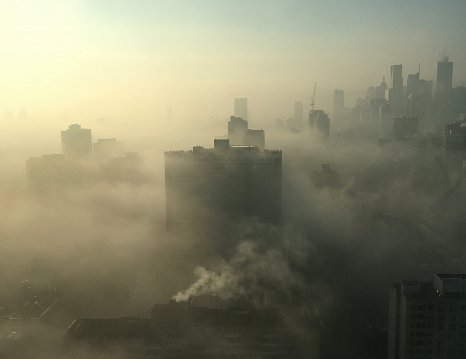VOCs at Work: Combating Harmful Air Pollution
What are Volatile Organic Compounds?

The quality of air the air we breathe really matters. When we’re out and about on the streets we can physically see the pollution around us, but this isn’t usually the case indoors. Most of us spend most of our time indoors, a lot of that in the workplace, and so the air quality at work really matters. Indoor air quality is impacted by many factors, but VOCs, or volatile organic compounds, are amongst the most dangerous.
What are Volatile Organic Compounds?
Volatile organic compounds, VOCs, are a type of gas emitted by both solids and liquids. VOCs come from a wide range of regular day-to-day items including cleaning supplies and some furniture coated with certain chemicals. When VOCs are used indoors it’s their concentration that becomes a problem, as they can be up to ten times more concentrated than outdoors and pose a threat to our health and overall air quality.
Where do you commonly find VOCs?
VOCs are part of the atmosphere and make up a percentage of all the air we breathe. One of the most common VOC compounds is formaldehyde, a colorless gas with a strong, distinctive smell. Formaldehyde is found in many common building materials including plywood. Workplace sources of VOCs also include office equipment such as printers and copiers, as well as ink and correction fluid. This is in additional to the VOCs present in cleaning chemicals used in the workplace. When they all come together is does add up and negatively impact the overall quality of air.
How do VOCs impact our Health?
Overexposure to VOCs can be very harmful to human health. A wide range of health issues have been attributed to VOCs exposure including:
- Irritation of the eyes, nose and throat
- Respiratory complaints and disease
- Loss of coordination and balance
- Headaches and nausea
- Damage to the central nervous system, liver and kidneys
Prolonged exposure to high concentrations of VOCs has been shown to cause permanent damage and particularly potent VOCs such as formaldehyde and the liquid compound benzene can even be carcinogenic for humans. While research is still being carried out in this area, it makes sense to avoid exposure to these substances wherever possible.
Common Symptoms of VOC Exposure
If you’re worried about VOCs in the workplace then keep in mind these common symptoms. While they could mean a number of things, if you’re worried about overexposure to VOCs it is worth being extra cautious:
- Headaches
- Nausea
- Shortness of breath
- Irritated eyes, nose or throat
- Allergic skin rashes
- Vomiting
- Nose bleeds
- Fatigue
- Periods of dizziness
Experiencing these symptoms is not proof you’ve experienced overexposure to VOCs but it could be something you want to look into.
Minimizing VOC Exposure
As we’ve explained, VOCs have become part of our atmosphere and are everywhere, but it is possible to counteract their negative impact and take steps to minimize exposure. Consider these steps:
-
Avoid VOC-based Sealants Building materials and even office furniture are often treated with sealants, sometimes even formaldehyde. Applying a further impermeable sealant to stop the VOCs from escaping into the atmosphere and becoming dangerous.
- Read all Labels
If you need to purchase chemicals or similar products then check the label closely. It is possible to find VOC-free alternatives to most products. If you do need a VOC-based product then be sure to keep it tightly sealed and in a well-ventilated area.
- Opt for a Green Cleaning Partner
Your business cleaning company can avoid the use of chemicals altogether if you opt for the right partner. At Penn Jersey we are committed to green cleaning and avoid the use of unnecessary chemical cleaners wherever possible. Minimizing the use of chemicals cuts back on VOCs in your air space.
Worrying about the air we breathe indoors may seem like a concern too far for many, but if we have concerns about fumes and pollution outdoors, it’s just as important when inside. It’s also important to remember that the concentration of harmful particles is higher indoors too, as they cannot escape into the atmosphere as easily.
Image via [Unsplash]( https://unsplash.com/photos/IWpd8KixceA)
